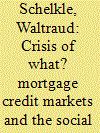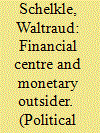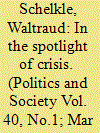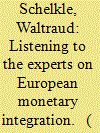| Srl | Item |
| 1 |
ID:
110870


|
|
|
|
|
| Publication |
2012.
|
| Summary/Abstract |
The crisis of 2007-09 was prefigured by bubbles in the housing and mortgage credit markets of major Organisation for Economic Co-operation and Development (OECD) countries. A comparison of the United States, the United Kingdom, and France reveals that, contrary to popular perception, the two European countries had a bigger housing price bubble, more volatility, and a more short-termist mortgage market. Yet, the fallout of the crisis-in terms of overindebtedness of mortgage holders, foreclosures of homes, and the extent to which the "nest-eggs" of households were devalued-has been worse in the United States. This article explores which differences in the use of credit markets for the social policy of promoting homeownership can account for this puzzling finding.
|
|
|
|
|
|
|
|
|
|
|
|
|
|
|
|
| 2 |
ID:
145553


|
|
|
|
|
| Summary/Abstract |
The UK's negotiating position in the area of ‘economic governance’ started from the assumption that there is a deep dividing line between insiders and outsiders of the ‘euro zone’. To protect the outsiders, the UK government did not ask for a veto, but for a safeguard mechanism that can postpone a decision in the euro area. This is exactly what David Cameron achieved in the negotiations with Council President Tusk. This article explains why the UK demands were so modest. Key is the peculiar situation of the UK being the major financial centre for a currency union to which it does not belong. Hence, the UK taxpayer needs protection from the City, and EU membership has helped to provide this. There is not much else a UK government could ask for.
|
|
|
|
|
|
|
|
|
|
|
|
|
|
|
|
| 3 |
ID:
110867


|
|
|
|
|
| Publication |
2012.
|
| Summary/Abstract |
This special issue of Politics & Society explores the relationship between social policy and financial markets, which was thrown into sharp relief by the financial crisis of 2007-09. The research asks how particular social policies underpin and even create financial markets, specifically mass markets for consumer finance, mortgages, and pensions.
|
|
|
|
|
|
|
|
|
|
|
|
|
|
|
|
| 4 |
ID:
156787


|
|
|
|
|
| Summary/Abstract |
Noah carl's article is a fairly representative contribution to the distinctive genre of ‘European dystopias’. His eurozone is a dystopia in the precise sense of the Oxford Dictionary: ‘An imagined place or state in which everything is unpleasant or bad, typically a totalitarian or environmentally degraded one.’ The fevered imaginations are usually those of US economists; the source of their bleak predictions is the economic theory of optimal currency areas. Carl extends the economic analysis to the realm of identity politics, and enlists a few more authors that inspired his own dystopia, among them that well-known scholar of all things monetary and European, Mrs ‘I-want-my-money-back’ Thatcher.
|
|
|
|
|
|
|
|
|
|
|
|
|
|
|
|